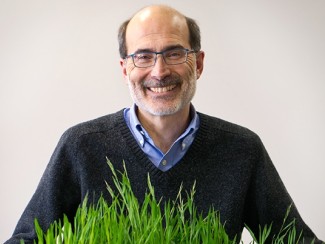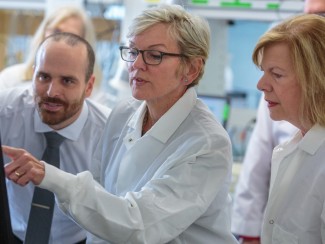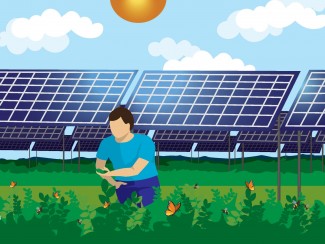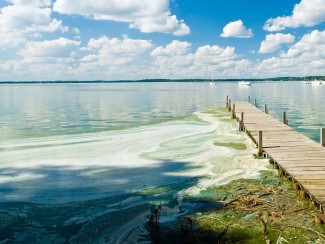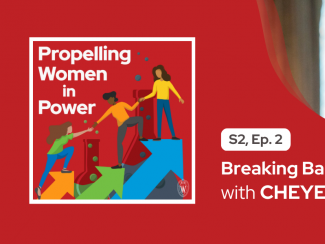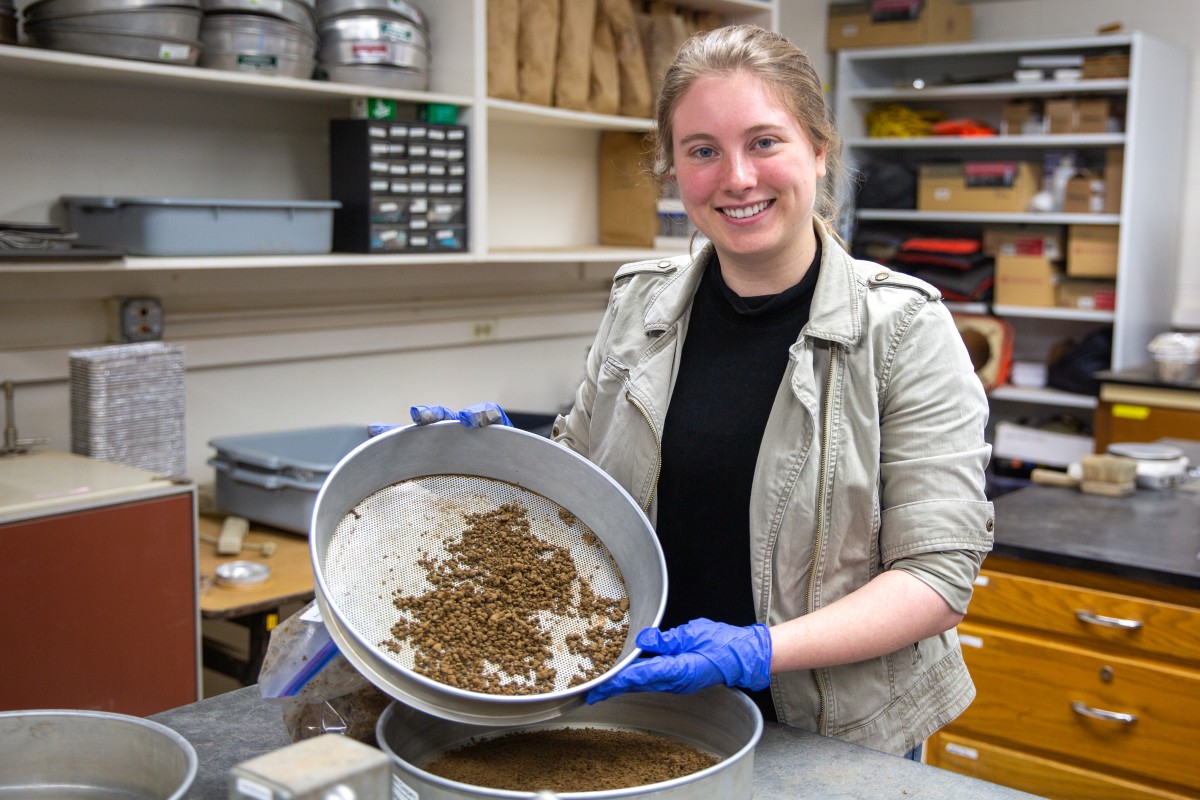
Our graduate students and postdoctoral researchers play an enormous role in the transition to a sustainable, resilient, and affordable energy future that is centered on social and economic equality. From lab experiments to fieldwork to classrooms, these leaders of today and tomorrow are our catalysts for energy discovery.
In this series, we learn more about what inspired these talented researchers, what brought them to their field of study, and the questions that drive their work at the Wisconsin Energy Institute.
Clare Dietz is a Ph.D. student in the Jackson Lab at UW–Madison, where she studies soil carbon and agricultural systems. She tells us about her research, background and the importance of storytelling in science.
Tell me about your background.
I'm originally from Dubuque, Iowa. I graduated from the University of Iowa in Iowa City in the spring of 2020. My bachelor's degree is actually in physics, with a minor in geography and a certificate in sustainability. Even though it’s my degree, I don’t do physics now. I also took a lot of creative writing classes and I'm grateful every day for all the lessons I learned.
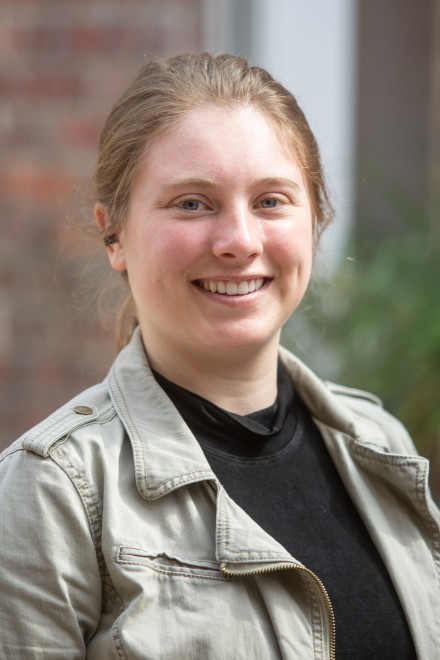
When did you come to UW-Madison?
I came here in the fall of 2020 and started a master's degree in agroecology, which applies ecological thinking to agricultural systems. The whole time I was working on that physics degree, I was intensely interested in sustainability and food systems. That led me to emailing Professor Randy Jackson here at UW-Madison to ask if he’d be my advisor for a master's in environment and resources. He said I could do a master's in agroecology instead, which seemed like a much better fit for me. It ended up being much better because it was specifically about agriculture. I got to meet a lot of very interesting people. It's a much smaller cohort, which I like.
What drew you to sustainability and food systems?
I am motivated by a desire to help people. I've been worried about climate change since I was in elementary school. Polar bears were my favorite animal. Being involved in this research lets me understand at least one tiny piece of the climate change puzzle and puts me in a position where I can have a little bit of authority, where people might listen.
How was it transitioning from physics to agroecology?
I had some research experience in undergrad, but I didn't anticipate how hard the transition would be. Physics was like breathing for me. I loved it, but I left it because it's really important to me that the work I do with my limited time on Earth is helping people, which I get to do with my research now. But the transition was difficult. I felt so behind. I had to work to build up all that background knowledge that other people spent four years of undergrad learning. I still don't think I've fully caught up, but at this point, I'm comfortable talking about my research and I understand this part of the soil puzzle.
You mentioned that you had always been interested in the environment. What sparked this passion for science and research?
I've always had a very methodical way of thinking. I was always very interested in thought experiments and mental puzzles. I love teasing things apart, and that's what I loved so much about physics. The math was hard, and a lot of it was not intuitive. But it was a big puzzle. If you understand it bit by bit, you eventually get to the right answer. That's what I like about the physical sciences. There is always that hope that if you gather enough data, you'll understand the system.
A lot of our work at the Jackson lab has started to incorporate more social science aspects. Transitioning to grasslands, pastures and such would have all of these biophysical impacts, but what about the social side of things? Is this something farmers are interested in? And if we made this change, what social impacts would that have? That doesn't have clear and easy answers, but at this point, I’ve grown enough to appreciate that sometimes there aren't going to be clear answers.
[This research] doesn't have clear and easy answers, but at this point, I’ve grown enough to appreciate that sometimes there aren't going to be clear answers.
Clare Dietz
You just finished your master’s in the Jackson lab. What was your research focus?
I looked at a long-term controlled experiment studying the effect of cropping systems on soil organic carbon. There's this long-term experiment out at the Arlington Research Station called the Wisconsin Integrated Cropping System Trial (WICST), which has been running since 1989. It has six different cropping systems representing everything from corn, soy, alfalfa systems, and a rotationally grazed pasture.
Those have been run as though they were for-profit farms following best management practices and recommendations, as though we, as researchers, were farmers following extension advice. I came in for my master's and analyzed the changes in soil organic carbon between 1989 and 2019. Right now, I'm still working on getting that work published.
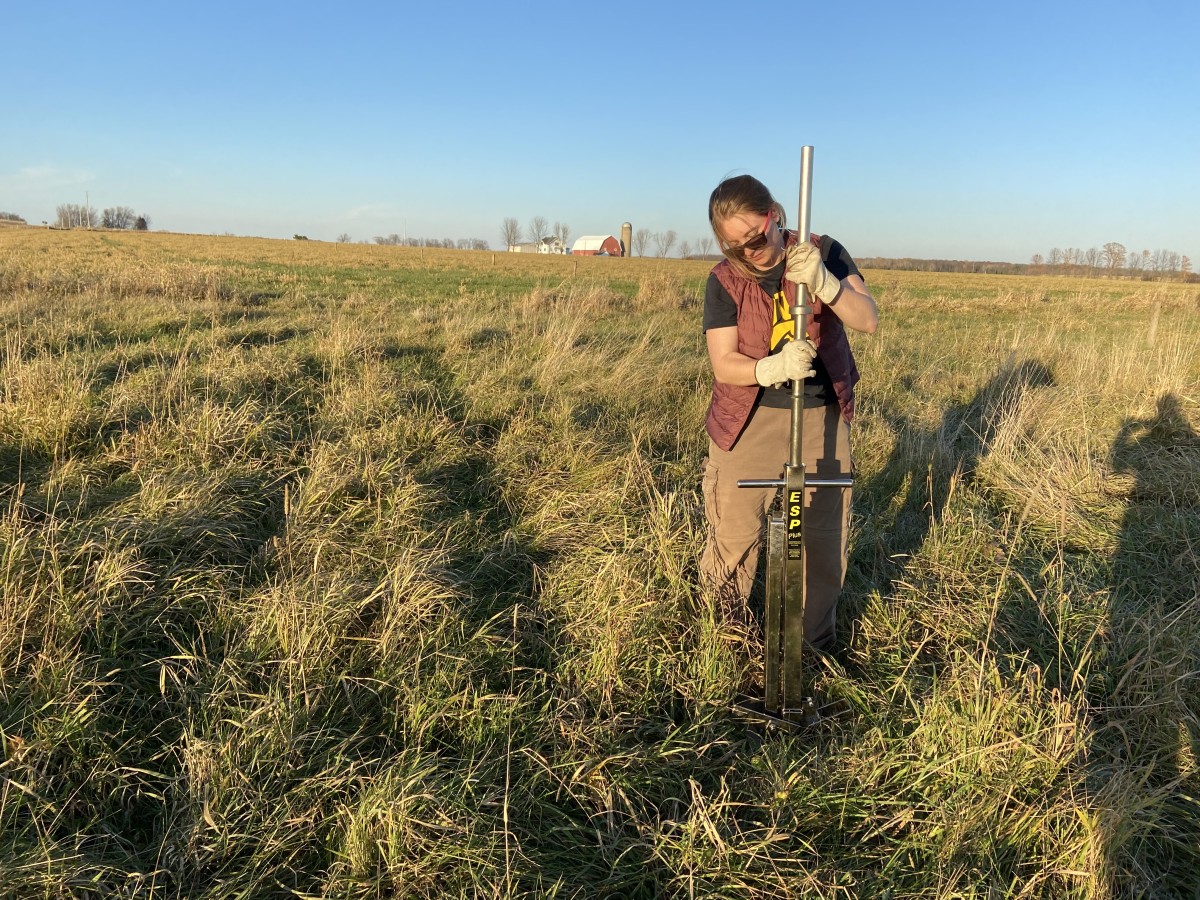
What did your master’s show?
We found over those 30 years, not a single system gained carbon. The rotationally grazed pasture held on to the carbon that it had, but all the other systems lost carbon following best management practices.
There are a couple of nuances like the soils we're working on are prairie soils, which start off with more carbon. But it's really hard to run a 30-year-long experiment the way that we have, so there are not a lot of other studies on other soils to compare our results to.
Why is soil organic carbon important?
Soil organic carbon is about 50% of organic matter, which has a lot of important agronomic benefits. For farmers, it helps with water retention and infiltration, nutrient cycling, erosion prevention, etc. Carbon is also a really hot topic right now because people are trying to build offset markets where, theoretically, companies would pay farmers to farm in a way that increases the carbon in their soils, because any carbon that's in the soil is carbon that's not in the atmosphere. Understanding how soil carbon changes with certain agricultural practices over time is very important then.
You’ve moved on to your Ph.D. now through the Nelson Institute in Environment and Resources. What will that be about?
I want to do a carbon dioxide warming experiment because we're already seeing changes from climate change. As the climate warms here in Wisconsin, the microbes are more active, and they're liberating carbon from the soil back to the atmosphere, but we haven’t proven that yet. What I want to do is bury some resistance cables in some fields, heat up the soil and see what happens to the carbon in place. When you do it in the lab, you miss out on a lot of other system responses. If you warm up the soil, the growing season will be longer. The plants will have more time to pull carbon out of the atmosphere and put it in the soil, so there are some potential checks and balances here that it's hard to account for in the lab.
We've also started looking at what happens if you take marginal land, land that's not very profitable for growing corn and soy, and put it in either restored prairie or monocultures of switchgrass or something the farmers could use to feed to cattle, allowing the land to still be useful to the farmers, but possibly better for the environment than trying to plant corn there.
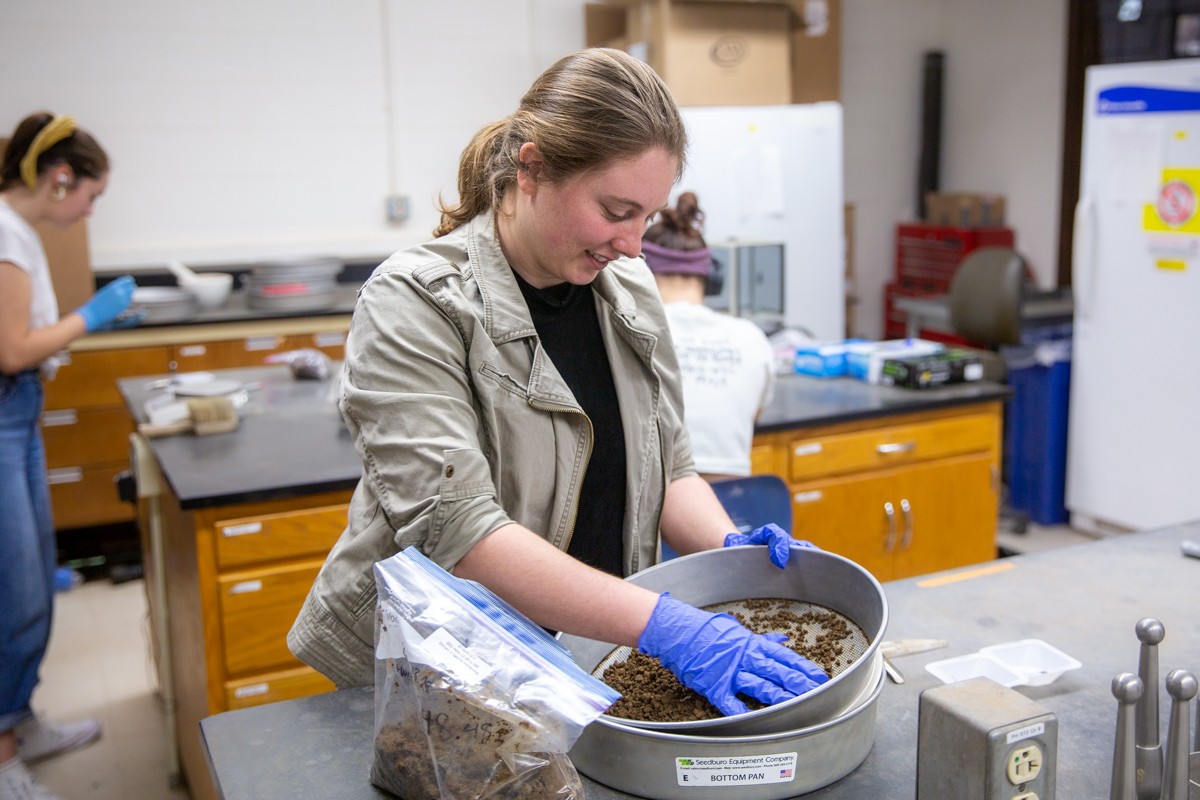
Describe a typical day for you.
These days it's a lot of sitting on my computer trying to understand what the data means. Before that, I was doing lab work, rolling soil up in tiny little tins the size of my fingernail, and then incinerating those to find out how much carbon there was in the soil. It was really fun. At the beginning of my master's, there was some opportunity for fieldwork to take samples. One thing I love about this work is that there are always new things.
In our lab, we all help each other out with fieldwork. Even though the fieldwork for my master's is done, I've still been able to go out and help with soil sampling with my colleague Ashley Becker. She's been looking at the social science aspect too. She'll interview farmers while we're taking soil samples on their land and be like, you know, how do you feel about carbon? What do you think about these carbon markets? I grew up in a suburban area and had this stereotypical image of farmers in my mind, but when you go and talk to them, that image changes. We're all just people.
From these different aspects, what has been your favorite part?
That's a hard question. I really like that I get to do it all. I think if I had to do just one thing all the time, I wouldn't be nearly as excited about the work. But, overall what I love is being part of a team. There are a couple of other grad students in the Jackson lab who are also doing carbon work. The other day, I sat down with Ashley in front of a whiteboard and we sketched out everything we knew about the nitrogen cycle and how it connects to the carbon cycle because it’s like Pandora’s box. She and I have been getting deeper and deeper into that rabbit hole. It's been really fun to have someone to go on that adventure with. I like that I've been able to be a part of a team in my grad school life because when I talk to old physicist colleagues, it's not like that for them. They have colleagues, but the work itself is done individually.
What do you like to do for fun outside of looking at soil?
I have cultivated a lot of hobbies. Because my work is so intimately connected to the climate change problem, I need to be able to put it down and walk away from it. In the winter, I do a lot of sewing, like clothes repair and alterations. I've gotten really fond of gardening in the summer. I am not good at it yet, but it's fun to just go and see things grow. It's like magic. The whole year round, I play Dungeons and Dragons with some people from my lab group. It's fun and that gets back to the storytelling I learned at the University of Iowa. Doing good science involves a bit of storytelling. You have to make the data meaningful because otherwise it is just numbers in a spreadsheet. What I learned in all my creative writing classes helps me do that in a way that feels authentic and accurate.
Doing good science involves a bit of storytelling. You have to make the data meaningful because otherwise it is just numbers in a spreadsheet.
Clare Dietz
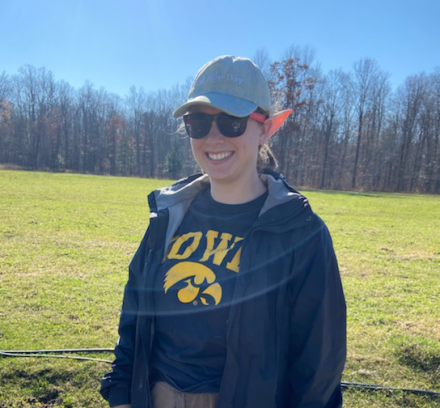
What has been a favorite memory of your time here so far?
I went soil sampling with Ashley Becker on Halloween. We have this new soil sampler that you don't need a big truck to do. It's like handheld and like installing a post, so it's very loud and a lot of physical labor. I brought along silicone elf ears and put them on as Ashley was setting up the soil sampler. She turned around and it was very funny, wearing elf ears and taking soil samples. That was really fun.

